+ Open data
Open data
- Basic information
Basic information
| Entry | Database: EMDB / ID: EMD-20653 | |||||||||
|---|---|---|---|---|---|---|---|---|---|---|
| Title | Calcium-bound MthK closed state | |||||||||
 Map data Map data | Calcium-bound MthK closed state | |||||||||
 Sample Sample |
| |||||||||
 Keywords Keywords | MthK / TRANSPORT PROTEIN | |||||||||
| Function / homology |  Function and homology information Function and homology informationmonoatomic cation transmembrane transporter activity / potassium ion transport / metal ion binding / identical protein binding / plasma membrane Similarity search - Function | |||||||||
| Biological species |   Methanothermobacter thermautotrophicus (archaea) Methanothermobacter thermautotrophicus (archaea) | |||||||||
| Method | single particle reconstruction / cryo EM / Resolution: 3.6 Å | |||||||||
 Authors Authors | Fan C / Nimigean CM | |||||||||
 Citation Citation |  Journal: Nature / Year: 2020 Journal: Nature / Year: 2020Title: Ball-and-chain inactivation in a calcium-gated potassium channel. Authors: Chen Fan / Nattakan Sukomon / Emelie Flood / Jan Rheinberger / Toby W Allen / Crina M Nimigean /    Abstract: Inactivation is the process by which ion channels terminate ion flux through their pores while the opening stimulus is still present. In neurons, inactivation of both sodium and potassium channels is ...Inactivation is the process by which ion channels terminate ion flux through their pores while the opening stimulus is still present. In neurons, inactivation of both sodium and potassium channels is crucial for the generation of action potentials and regulation of firing frequency. A cytoplasmic domain of either the channel or an accessory subunit is thought to plug the open pore to inactivate the channel via a 'ball-and-chain' mechanism. Here we use cryo-electron microscopy to identify the molecular gating mechanism in calcium-activated potassium channels by obtaining structures of the MthK channel from Methanobacterium thermoautotrophicum-a purely calcium-gated and inactivating channel-in a lipid environment. In the absence of Ca, we obtained a single structure in a closed state, which was shown by atomistic simulations to be highly flexible in lipid bilayers at ambient temperature, with large rocking motions of the gating ring and bending of pore-lining helices. In Ca-bound conditions, we obtained several structures, including multiple open-inactivated conformations, further indication of a highly dynamic protein. These different channel conformations are distinguished by rocking of the gating rings with respect to the transmembrane region, indicating symmetry breakage across the channel. Furthermore, in all conformations displaying open channel pores, the N terminus of one subunit of the channel tetramer sticks into the pore and plugs it, with free energy simulations showing that this is a strong interaction. Deletion of this N terminus leads to functionally non-inactivating channels and structures of open states without a pore plug, indicating that this previously unresolved N-terminal peptide is responsible for a ball-and-chain inactivation mechanism. | |||||||||
| History |
|
- Structure visualization
Structure visualization
| Movie |
 Movie viewer Movie viewer |
|---|---|
| Structure viewer | EM map:  SurfView SurfView Molmil Molmil Jmol/JSmol Jmol/JSmol |
| Supplemental images |
- Downloads & links
Downloads & links
-EMDB archive
| Map data |  emd_20653.map.gz emd_20653.map.gz | 4.6 MB |  EMDB map data format EMDB map data format | |
|---|---|---|---|---|
| Header (meta data) |  emd-20653-v30.xml emd-20653-v30.xml emd-20653.xml emd-20653.xml | 12.4 KB 12.4 KB | Display Display |  EMDB header EMDB header |
| Images |  emd_20653.png emd_20653.png | 197.3 KB | ||
| Filedesc metadata |  emd-20653.cif.gz emd-20653.cif.gz | 5.2 KB | ||
| Archive directory |  http://ftp.pdbj.org/pub/emdb/structures/EMD-20653 http://ftp.pdbj.org/pub/emdb/structures/EMD-20653 ftp://ftp.pdbj.org/pub/emdb/structures/EMD-20653 ftp://ftp.pdbj.org/pub/emdb/structures/EMD-20653 | HTTPS FTP |
-Related structure data
| Related structure data |  6u5rMC  6u5nC  6u5pC  6u68C  6u6dC  6u6eC  6u6hC  6uwnC  6ux4C  6ux7C  6uxaC  6uxbC C: citing same article ( M: atomic model generated by this map |
|---|---|
| Similar structure data |
- Links
Links
| EMDB pages |  EMDB (EBI/PDBe) / EMDB (EBI/PDBe) /  EMDataResource EMDataResource |
|---|---|
| Related items in Molecule of the Month |
- Map
Map
| File |  Download / File: emd_20653.map.gz / Format: CCP4 / Size: 52.7 MB / Type: IMAGE STORED AS FLOATING POINT NUMBER (4 BYTES) Download / File: emd_20653.map.gz / Format: CCP4 / Size: 52.7 MB / Type: IMAGE STORED AS FLOATING POINT NUMBER (4 BYTES) | ||||||||||||||||||||||||||||||||||||||||||||||||||||||||||||
|---|---|---|---|---|---|---|---|---|---|---|---|---|---|---|---|---|---|---|---|---|---|---|---|---|---|---|---|---|---|---|---|---|---|---|---|---|---|---|---|---|---|---|---|---|---|---|---|---|---|---|---|---|---|---|---|---|---|---|---|---|---|
| Annotation | Calcium-bound MthK closed state | ||||||||||||||||||||||||||||||||||||||||||||||||||||||||||||
| Projections & slices | Image control
Images are generated by Spider. | ||||||||||||||||||||||||||||||||||||||||||||||||||||||||||||
| Voxel size | X=Y=Z: 1.096 Å | ||||||||||||||||||||||||||||||||||||||||||||||||||||||||||||
| Density |
| ||||||||||||||||||||||||||||||||||||||||||||||||||||||||||||
| Symmetry | Space group: 1 | ||||||||||||||||||||||||||||||||||||||||||||||||||||||||||||
| Details | EMDB XML:
CCP4 map header:
| ||||||||||||||||||||||||||||||||||||||||||||||||||||||||||||
-Supplemental data
- Sample components
Sample components
-Entire : Calcium-bound MthK
| Entire | Name: Calcium-bound MthK |
|---|---|
| Components |
|
-Supramolecule #1: Calcium-bound MthK
| Supramolecule | Name: Calcium-bound MthK / type: complex / ID: 1 / Parent: 0 / Macromolecule list: #1 |
|---|---|
| Source (natural) | Organism:   Methanothermobacter thermautotrophicus (archaea) Methanothermobacter thermautotrophicus (archaea) |
-Macromolecule #1: Calcium-gated potassium channel MthK
| Macromolecule | Name: Calcium-gated potassium channel MthK / type: protein_or_peptide / ID: 1 / Number of copies: 8 / Enantiomer: LEVO |
|---|---|
| Source (natural) | Organism:   Methanothermobacter thermautotrophicus (archaea) Methanothermobacter thermautotrophicus (archaea) |
| Molecular weight | Theoretical: 37.35616 KDa |
| Recombinant expression | Organism:  |
| Sequence | String: MVLVIEIIRK HLPRVLKVPA TRILLLVLAV IIYGTAGFHF IEGESWTVSL YWTFVTIATV GYGDYSPSTP LGMYFTVTLI VLGIGTFAV AVERLLEFLI NREQMKLMGL IDVAKSRHVV ICGWSESTLE CLRELRGSEV FVLAEDENVR KKVLRSGANF V HGDPTRVS ...String: MVLVIEIIRK HLPRVLKVPA TRILLLVLAV IIYGTAGFHF IEGESWTVSL YWTFVTIATV GYGDYSPSTP LGMYFTVTLI VLGIGTFAV AVERLLEFLI NREQMKLMGL IDVAKSRHVV ICGWSESTLE CLRELRGSEV FVLAEDENVR KKVLRSGANF V HGDPTRVS DLEKANVRGA RAVIVDLESD SETIHCILGI RKIDESVRII AEAERYENIE QLRMAGADQV ISPFVISGRL MS RSIDDGY EAMFVQDVLA EESTRRMVEV PIPEGSKLEG VSVLDADIHD VTGVIIIGVG RGDELIIDPP RDYSFRAGDI ILG IGKPEE IERLKNYISA UniProtKB: Calcium-gated potassium channel MthK |
-Macromolecule #2: CALCIUM ION
| Macromolecule | Name: CALCIUM ION / type: ligand / ID: 2 / Number of copies: 8 / Formula: CA |
|---|---|
| Molecular weight | Theoretical: 40.078 Da |
-Macromolecule #3: water
| Macromolecule | Name: water / type: ligand / ID: 3 / Number of copies: 8 / Formula: HOH |
|---|---|
| Molecular weight | Theoretical: 18.015 Da |
| Chemical component information |  ChemComp-HOH: |
-Experimental details
-Structure determination
| Method | cryo EM |
|---|---|
 Processing Processing | single particle reconstruction |
| Aggregation state | particle |
- Sample preparation
Sample preparation
| Buffer | pH: 8.5 Component:
| |||||||||
|---|---|---|---|---|---|---|---|---|---|---|
| Grid | Model: Quantifoil, UltrAuFoil, R1.2/1.3 / Material: GOLD / Mesh: 300 | |||||||||
| Vitrification | Cryogen name: ETHANE / Chamber humidity: 100 % / Chamber temperature: 296 K / Instrument: FEI VITROBOT MARK IV / Details: blotting for 2 seconds (blot force 0). |
- Electron microscopy
Electron microscopy
| Microscope | FEI TITAN KRIOS |
|---|---|
| Image recording | Film or detector model: GATAN K2 SUMMIT (4k x 4k) / Detector mode: COUNTING / Average exposure time: 8.0 sec. / Average electron dose: 52.0 e/Å2 |
| Electron beam | Acceleration voltage: 300 kV / Electron source:  FIELD EMISSION GUN FIELD EMISSION GUN |
| Electron optics | Illumination mode: FLOOD BEAM / Imaging mode: BRIGHT FIELD / Nominal defocus max: 2.4 µm / Nominal defocus min: 1.4000000000000001 µm / Nominal magnification: 59000 |
| Experimental equipment |  Model: Titan Krios / Image courtesy: FEI Company |
- Image processing
Image processing
| Startup model | Type of model: INSILICO MODEL / Details: generated using Cryosparc |
|---|---|
| Final reconstruction | Applied symmetry - Point group: C4 (4 fold cyclic) / Resolution.type: BY AUTHOR / Resolution: 3.6 Å / Resolution method: FSC 0.143 CUT-OFF / Software - Name: RELION (ver. 3) / Number images used: 22677 |
| Initial angle assignment | Type: PROJECTION MATCHING / Software - Name: RELION (ver. 3) |
| Final angle assignment | Type: PROJECTION MATCHING / Software - Name: RELION (ver. 3) |
-Atomic model buiding 1
| Refinement | Space: REAL |
|---|---|
| Output model |  PDB-6u5r: |
 Movie
Movie Controller
Controller
















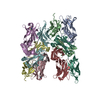
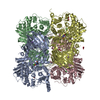
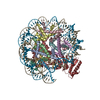

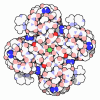
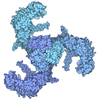
 Z (Sec.)
Z (Sec.) Y (Row.)
Y (Row.) X (Col.)
X (Col.)





















